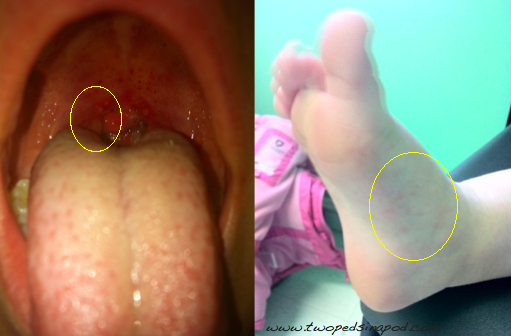Hand-foot-mouth Disease
 We’re seeing a lot of this stuff around the office. It’s “hand-foot-mouth” disease, a common, self-limited illness caused by the Coxsackie virus, and it strikes most often in the spring and summer. Named for rashes which can affect the hands, feet, or mouth, this illness can cause fever for the first few days as well as some loose stools.
We’re seeing a lot of this stuff around the office. It’s “hand-foot-mouth” disease, a common, self-limited illness caused by the Coxsackie virus, and it strikes most often in the spring and summer. Named for rashes which can affect the hands, feet, or mouth, this illness can cause fever for the first few days as well as some loose stools.
What does it look like?
If you look carefully at the photos, you will see faint red bumps on this child’s feet. The rash may also look like tiny blisters and will always blanch (if you press on it and lift up your finger, the redness will briefly disappear- just as if you pressed on a sunburn). The same rash may appear on the hands and is not itchy. The child’s throat above is red in the back and has several ulcers, or canker sores. The hands, feet and mouth are not always simultaneously affected, and although we don’t call the illness “hand-foot-mouth-tush” disease, sometimes kids also get a red bumpy rash on their buttocks.
Is hand-foot-mouth disease painful?
The throat ulcers can be quite painful and the rash on the feet may be slightly tender. Usually the rash on the hands is not felt by the child. You can alleviate your child’s throat pain with acetaminophen (brand name Tylenol) or ibuprofen (brand names Advil or Motrin). For toddlers and older, Magic Mouthwash, a mix of 1/4 tsp diphenhydramine (plain liquid Benadryl) and 1/4 tsp Maalox (the regular adult stuff) squirted over mouth ulcers prior to eating a meal (three times a day) is an age-old way to sooth sores.
How is it spread?
This virus is contagious through saliva. Prevent kids from sharing cups, eating utensils, and tooth brushes, and clean up toddler drool. This vigilance can help prevent the virus from spreading to family members and friends. Children with this virus can still attend daycare as long as they are not feeling ill. Typically after the first few days of illness, fever and pain subside. Most commonly the rash and mouth ulcers last about a week or two.
What is the treatment?
Unfortunately there is no treatment for hand-foot-mouth disease, but fortunately your child’s body is fully capable of fighting off the virus. Your role is to help soothe pain. Otherwise, kids may refuse to drink and end up dehydrated. When my son had this illness at age two, he liked sucking on a washcloth soaked in very cold water. I also gave him lots of sherbet, ice cream, milk shakes, and noodles. These foods were easier for him to swallow while his throat was sore.
When should I call my kid’s doctor?
Kids can get this virus more than once, and many strains of this virus circulate. Even parents are not always immune. So now add Coxsackie virus, or hand-foot-mouth disease, to your Dr. Mom and Dr. Dad list of manageable diseases. Knowledge is power. However, if your child’s fever lasts more than three days, if he does not drink enough to urinate his baseline amount, if he is inconsolable, seems disoriented, or if your parent gut-instinct tells you something more might be wrong, do get your child to medical attention.
Julie Kardos, MD and Naline Lai, MD
©2014 Two Peds in a Pod®
Originally posted June, 2011, and right on cue, Coxsackie is back again this summer.